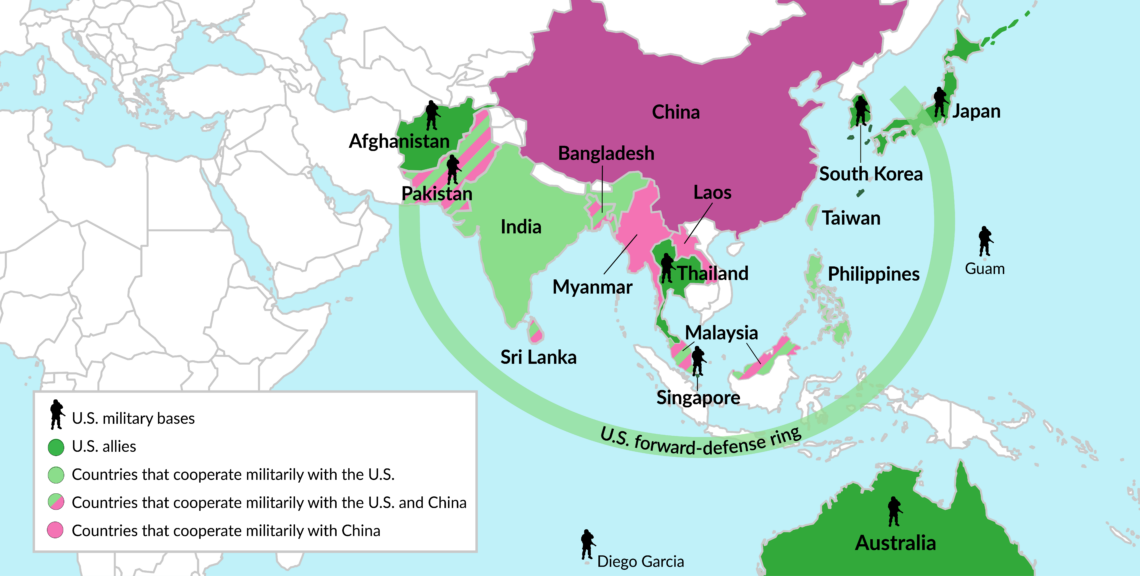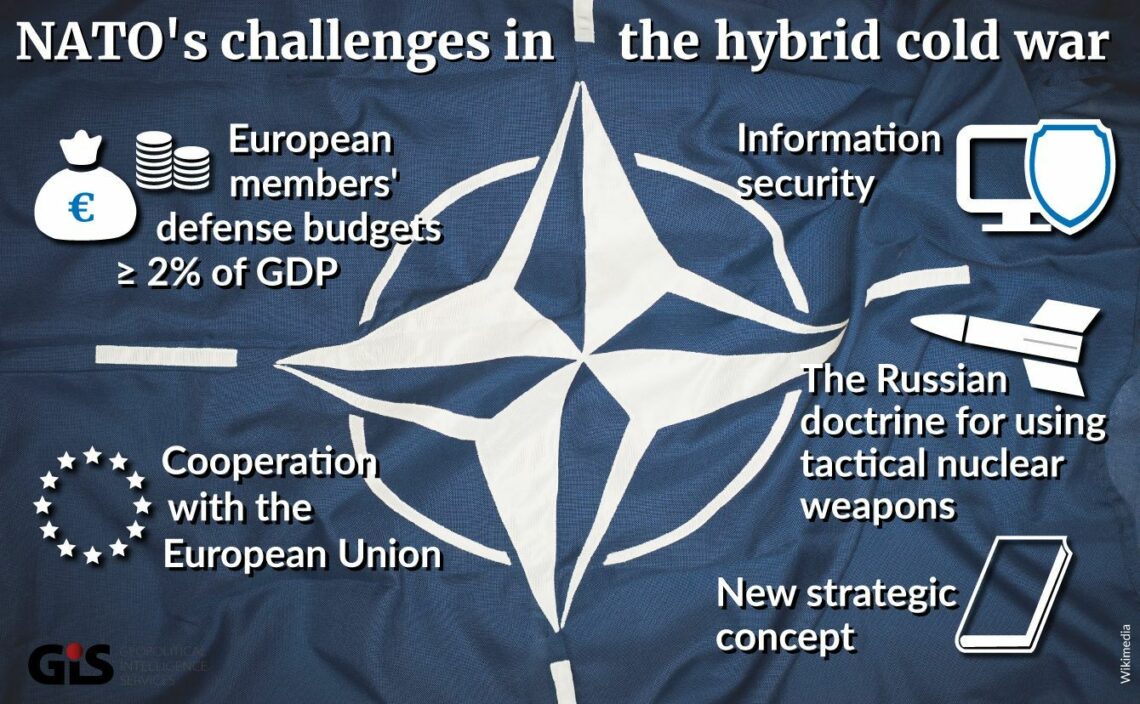Is the world safe from major war?
From trade protectionism to government overspending, bad economic ideas are weakening the world’s stability, while increasingly confrontational policies are adopted by global and regional powers.

In a nutshell
- Free-market economics that have brought humankind unparalleled progress are being replaced with long-discredited statist dogmas
- Excessive government debts, too, are pushing many countries to irresponsible, nationalistic policies
- In the longer term, unsolved economic problems coupled with geopolitical challenges tend to lead to wars
The Munich Security Conference (MSC) stands among the world’s oldest and most important fora for security discussion, with the attendance of top-level decision makers from key countries around the globe, nongovernment organizations, industry, academia and media. The latest edition of the MSC was gloomy, mirroring the current international situation.
The February 2018 conference, named “To the Brink and Back,” brought to the fore irreconcilable differences among the world powers. Every discussion pointed to further conflict. Leaders hurled accusations at each other in the most aggressive way. They all did it: Americans and Russians, Israelis and Iranians, to name just a few. In the past, the participants at least pretended that the world might become a safer place as a result of their efforts. In 2018, bad news prevailed.
Overwhelmed leaders
The MSC head, Ambassador Wolfgang Ischinger, observed in his concluding remarks that while some great ideas, good insights, and bold visions had been presented during the event’s two and a half days, not enough “concrete steps” to “implement good visions” and “prevent the bad perspectives” were being taken by world leaders. Coming from one of the world’s most experienced diplomats, this was an alarming observation.
Why is such darkness setting around us?
Surely, there are positive developments in today’s world. Great strides have been made in eradicating extreme poverty and hunger, especially in Asia and Latin America. Illiteracy, holding back half of the global population only 50 years ago, today stands at some 15 percent. This enormous progress has been achieved through entrepreneurship, technological innovation, higher productivity, market economies and global trade.
The rising wave of protectionism is curbing trade, but the even worse consequence hides in limiting competition.
And yet, these benevolent mechanisms are increasingly under attack from politicians and special interest groups. Policies are evolving in ways that are detrimental to further development. The old populist canard of a “zero-sum game” is again gaining traction with claims that one person’s gain must be someone else’s loss. The possibility that everybody gains from technological progress, innovation and higher productivity is ignored. The purported solution – a remedy which failed repeatedly in the past – is to fight poverty and economic inequality with government-enforced redistribution.
Assault on trade
The rising wave of protectionism is curbing trade, but the even worse consequence hides in limiting competition, which leads to lower productivity and less incentive to innovate. Different excuses are used to justify such policies. Most commonly, foreign producers are vilified. In the United States, which has a long tradition of shielding its market, the justification is the protection of jobs. The European Union, always quick to criticize U.S. trade practices, is even more restrictive, using the pretense of consumer protection. The big emerging economies, such as China and India, are playing a two-faced game: they erect walls around their domestic markets while loudly presenting themselves as free-trade champions (and of course harping about the policies of U.S. President Donald Trump).
Research by Gowling WLG, an international law firm, shows that the world’s top 60 economies have adopted as many as 7,000 protectionist measures since the financial crisis of 2008. From 2009 to 2016, the EU introduced 5,657 restrictive trade policies, and only 4,594 that liberalized trade. The numbers show a thickening protectionist jungle handicapping global trade flows.
Realistically speaking, trade conflicts have always existed and even “free trade zones” are not completely void of protectionist elements. Even such banner trade-liberation initiatives as the Trans-Pacific Partnership (TPP) and the Transatlantic Trade and Investment Partnership (TTIP) would have discriminated against third-party countries. Still, these projects would have lifted the markets and helped the participants. What we are seeing instead is a strong increase in protectionism.
Looming financial disaster
Staggering sovereign deficits are another alarming symptom of the crisis we are in. These deficits necessitate excessive borrowing by governments and, in consequence, lead to monetary policies that are bound to cast doubt on the inherent value of all major currencies. Such overspending, to the debit of the future, cannot continue indefinitely – the scheme works only as long as societies continue to trust their institutions. And this may end abruptly, stalling the wealth-producing engine.
The result would be a drastic increase in poverty, mainly in areas with low to negative demographic growth, and new pressure on the present governance structures, especially in developed, democratic nations. These structures’ basic soundness would be questioned. Breaches of legal and constitutional principles are already taking place, even in Western democracies, allegedly because governments have no other choice. If things do not change, such violations will only become more frequent. The consequences would be felt most dramatically in the countries with aging populations, as their retirement systems are largely underfunded.
Even the best economists cannot come up with satisfying solutions to such formidable challenges.
Wars tend to fix economic misalignments in a terrible way.
This financial predicament, created by the governments themselves, puts a huge strain on politics. Leaders are too focused on managing the intertwined economic and financial crises at home to pay sufficient attention to issues of global security. Moreover, countries’ foreign and security policies are increasingly shaped by internal considerations.
Economy and war
History teaches us that unsolved economic problems often lead to wars. There are at least several prominent exceptions to the theory that democracies do not start wars in general, and especially not with each other. Unfortunately, leading political parties in the West have already resorted to subverting the basic principles of democracy to remain in power. Instead of the democratic “end of history,” predicted after the collapse of Soviet communism, democracies appear to be in decline. Sinking in self-made economic and political quicksands, they now resort to ever greater protectionism and nationalism.
All this is laying the groundwork for war. Wars tend to fix economic misalignments in a terrible way.
The danger is not fully appreciated because foreign policy strategists tend to ignore the importance of the economy, while the economists are not sufficiently versed in foreign and security policy issues. Good geopolitics brings together all these elements.
While governments are busy struggling with their self-inflicted problems, the geopolitical framework of security structures, shaped after World War II, is undergoing a tectonic change. The economic and social problems discussed above are only adding to these tensions.
In 1945, the U.S. found itself the predominant financial power with the dollar as a global currency. Politically, a bipolar system dominated by the U.S. and the Soviet Union emerged, with two worlds apart political, ideological and economic systems. After the Soviet system cratered in the late 1980s, the U.S. and a handful of other highly developed, democratic nations seemed destined to continue in the role of a benevolent Western hegemon bringing well-being to the rest of the world.
Fault lines
After the turn of the millennium, however, new powers, China in particular, began to challenge the Western system, especially the financial, geopolitical and military dominance of the U.S. The financial crisis of 2008 cast huge doubt on the West’s superiority in economic and monetary matters.
Facts & figures
China feels frustrated as it is contained by a U.S.-led alliance

The biggest emerging power, China, feels contained militarily by a U.S.-led alliance, while being taxed economically by the worldwide dependence on the U.S. dollar. Russia is resurging from the implosion of the Soviet Union and is clawing its way back to the rank of a major Eurasian power – the only way it sees to secure its very long land borders. Moreover, both China and Russia remain deeply resentful of historical defeats inflicted on them by the West: on China in the 19th and early 20th centuries, and on Russia more recently, after the dissolution of the Soviet empire. India, poised to become the world’s most populous country, also wants its place in global politics.
Europe, meanwhile, has developed an identity problem: it haplessly bounces back and forth between two orientations: its traditional vector toward North Atlantic and the U.S. in the west, and toward Eurasia in the east.
Regional powers are becoming more assertive as well, increasing tensions in the Middle East, Africa and in Central and South Asia. The big powers frequently sponsor the lesser ones in regional conflicts. The prime examples are the wars in Syria and Yemen, and the simmering unrest in Iraq, which reflects the tensions between Iran, Saudi Arabia, Turkey and Israel – all of them regional powers with varying alliances. In these conflicts, Russia and the U.S. are directly and indirectly involved.
North Korea’s dogged pursuit of nuclear military capabilities adds another layer to the tensions.
Another volatile region is the Asian triangle of India, China and Pakistan; it involves other countries in the area, too. Pakistan, a long-standing U.S. ally, feels betrayed by its old partner and has turned toward China. Closer links with this country help China develop its western provinces, but especially valuable to Beijing is gaining access through Pakistan to the Indian Ocean. Meanwhile, the U.S. looks to India as an ally.
Leadership issue
In East Asia, especially in the East and South China Seas, a direct political and military confrontation between China and the U.S. and its allies has developed. China claims hegemony on its seas, which is contested by the U.S. This situation is hardly new, but tensions have been building steadily. A hybrid war is underway there already, with trade restrictions imposed and hacking attacks conducted. North Korea’s dogged pursuit of nuclear military capabilities adds another layer to the tensions, though it probably is not the largest threat. Altogether, the region stands today as the most dangerous region on the globe.
Another trouble area is Russia’s western border, where NATO and Russian forces are at a standoff. While the breakout of outright war in Central or Northern Europe is unlikely, the tensions poison relations. Here, too, the sanctions, mutual hacking, interference in internal affairs and propaganda already amount to a hybrid war. In the Middle East, different warring groups are supported either by the U.S. or Russia.
Facts & figures

The present leadership in the West is weak. The European elites, especially, devoid of clearly defined values and convictions, are no match for Russian and Chinese strategists. Western business, however, remains a powerful asset – if wisely used. Economic sanctions, for example, are harmful both to Russia and the West. In Russia, they hurt the people, not the regime. It only feeds nationalism there.
Business remains the most stabilizing factor in the world’s present geopolitical situation. It helps to maintain peace and a degree of economic and social stability.
Foreign policies are powered by countries’ economic objectives, trade needs and considerations for internal stability. Economic issues tend to be a complicating factor in the development of foreign policies and fostering security. In many instances, policies are shaped by outdated theories, schoolbook models and wishful thinking among the politicians implementing them. Leaders of states do not sufficiently account for technological, economic and social changes taking place in their countries, and in the world, when making critically important decisions.
Need for change
A new and more flexible approach is necessary. The appointment of a businessman such as Rex Tillerson to the post of U.S. secretary of state appeared to be a harbinger of more pragmatic thinking. Opening the foreign policy apparatus more to business and private-sector thinking would help the governments overcome outdated mindsets, especially those related to better understanding the motivation, anxieties, strengths and weaknesses of other players – be they the opponents, allies or neutral parties. Mr. Tillerson is now replaced by CIA Director Mike Pompeo as head of the U.S. diplomacy. Hopefully, Mr. Pompeo will continue his predecessor’s pragmatic approach to the task.
Unfortunately, such input will not suffice. The combination of rapidly increasing global tension among big powers, local armed conflicts, growing protectionism and unsolvable dilemmas in the countries’ public finances, has created an explosive mix. The eruption of a larger war is becoming more likely.
The outcome of the Munich conference was food for thought, as was Russian President Vladimir Putin’s recent address to his country’s Federal Assembly. Accompanying the speech was a large-screen computer animation that showed Russia’s newest intercontinental ballistic missile (ICBM) attack targets in Florida. The message seems to have been that Russia would not hesitate to use nuclear deterrence if its interests were threatened. Even more remarkable among recent news was China President Xi Jinping’s consolidation of power, which would be needed in a major war.
Is a major war inevitable? I still do not think so, but odds that it will occur have increased dangerously.
